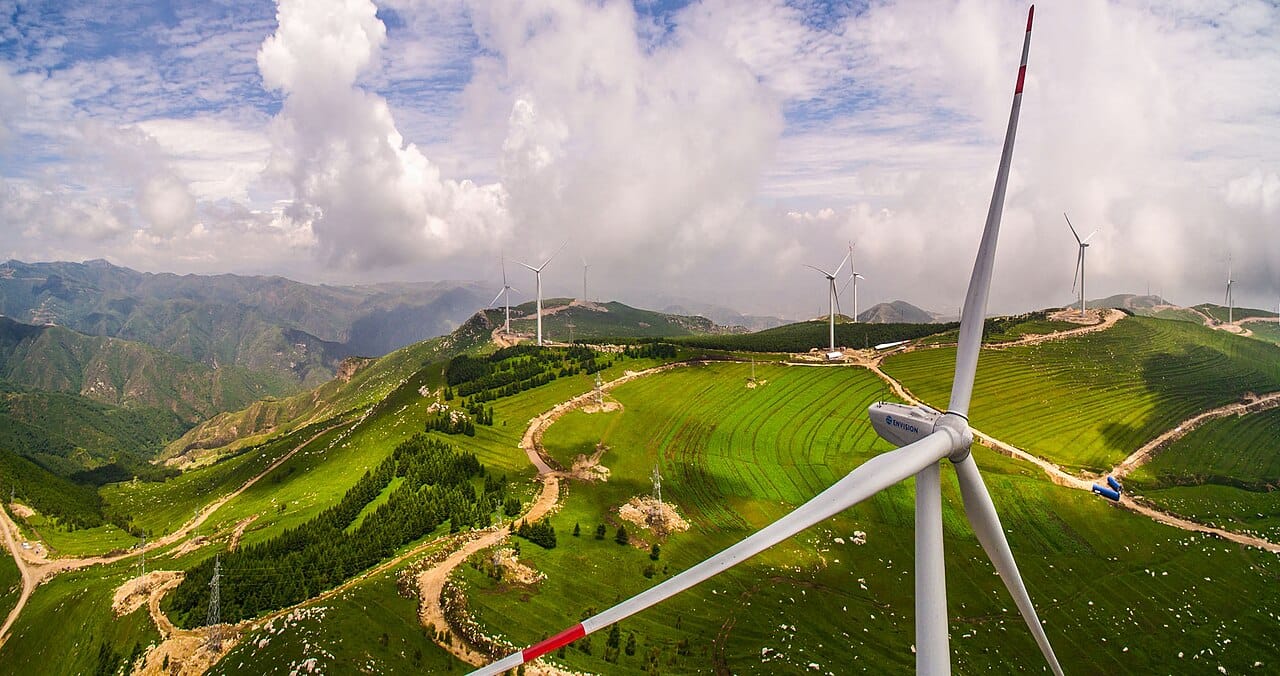
Will China save the world from climate change?
The only shocking thing is that so few others are doing the same.
[Previous: If America won't build the future, China will gladly do it]
Climate change is a massive and looming problem, threatening the future of civilization. How many countries are taking the danger seriously? How many are decarbonizing at the scale required even to stand a chance of averting the worst consequences?
By an objective accounting, there's only one country that can answer yes. That country is China.
In the first half of 2025, China deployed more solar power than the rest of the world—combined. In that time, humanity as a whole installed 380 gigawatts of new solar capacity, of which China accounted for 256 gigawatts. Almost two-thirds!
This isn't a fluke, but the continuation of a trend. Similarly, in 2024, the world installed 600 GW of solar power. Of that number, China accounted for 329 GW. The U.S. was far behind in second place, with a measly 50 GW. Most other countries installed far less.
The scale of China's ambition can be seen in the desert of northwestern Xinjiang, where they've constructed the biggest solar farm in the world. It's almost 33,000 acres, about the size of Paris, with a total capacity of 3.5 gigawatts. It's big enough to power a small country by itself.
This massive build-out of renewables is having an effect. Studies suggest that China's carbon emissions are beginning to fall, without any reduction in economic activity.
How much energy is that?
To put these numbers in perspective: In 2024, humanity as a whole consumed approximately 186,000 terawatt-hours of energy. Since there are 8,760 hours in a year, that equates to a total energy production capacity of 21 terawatts, or 21,000 gigawatts.
By late 2024, the world hit a record of two terawatts of solar capacity. By the end of the decade, we could be installing a terawatt of solar per year.
This is a blistering pace, shattering all historical precedent. The only reason it's not fast enough is the even more colossal scale of the problem. To solve climate change, we have to rebuild civilization's energy underpinnings from scratch. (Of course, it's also true that, unlike other energy sources, solar farms don't generate power twenty-four hours a day.)
There's no question that the sun can supply our energy needs. Each and every hour, our home star bathes the planet with as much energy as humanity uses in a year. Even at current efficiencies, we could capture all we need by covering about 1% of the Earth's surface with solar panels—a tiny fraction of what we currently use for agriculture.
Capturing this energy ought to be a no-brainer. Renewables already have an unbeatable cost advantage: according to the International Renewable Energy Agency, as of July 2025, solar photovoltaics are 40% cheaper than coal, oil or gas. Wind is cheaper still. Passing up this bounty is like ignoring free money raining from the sky.
Why isn't this more widely recognized? Why is China taking the lead in building the future, while so much of the world stays stuck in the technology and mindset of the past?
Do you have to hand it to China?
Lest I be accused of writing propaganda for Beijing, there's one massive caveat: We shouldn't be rooting for China to be the country that saves the world!
That Paris-sized solar farm mentioned earlier is in Xinjiang, where the Chinese government has been persecuting and imprisoning the Uyghur people on a huge scale. While most of the world has condemned Russia's genocidal aggression in Ukraine, China has turned a blind eye and is even supplying Moscow with weapons and supplies to continue the war. And, of course, Chinese citizens possess none of the freedoms at home that most of us privileged Westerners take for granted.
It's infinitely preferable that the future be written by a liberal democracy, not an authoritarian one-party state. There was a time when the United States of America could claim to be the world superpower guiding humanity into the future. But America has ceded its place in the global order.
The United States is deep in the throes of anti-intellectualism and smug ignorance, funded by a fossil-fuel lobby that would gladly burn down the planet as long as they get a good price for their stock options. The second Trump administration is staffed with anti-science ideologues bent on erasing all the progress that was made under Biden. It will be a long time before other nations look to us for leadership, if they ever do again.
Arguably, by surging ahead in renewable energy, China fits the model of the "enlightened despot"—the ruler who governs in his people's best interests, whether they want him to or not.
It benefits no one to let climate change destroy civilization. Very soon, we'll be staring down the barrel of refugee crises, wars, resource shortages and disasters that threaten everyone. No one is safe from these threats. Even the rich and privileged aren't immune, as we saw when devastating wildfires in Los Angeles consumed some of the world's most expensive and exclusive real estate.
China is an authoritarian state, but their rulers are educated and rational enough to recognize the problem and draw the logical conclusion about what needs to be done. The shocking thing isn't that they're taking action, but that so few other countries are showing the same urgency.
